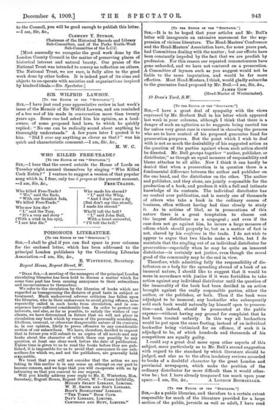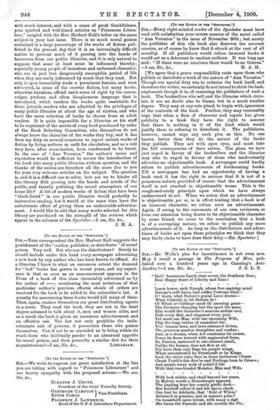[To TEE EDITOR OP THE "SPECTATOR. "]
SIR,—As a public librarian, and therefore to a certain extent responsible for much of the literature provided for a large section of the public, juvenile as well as adult, I have read with much interest, and with a sense of great thankfulness, your spirited and well-timed articles on "Poisonous Litera- ture," coupled with the Rev. Herbert Bull's letter on the.same subject in your last issue. There is so much moral poison contained in a large percentage of the works of fiction pub- lished in the present day that it is an increasingly difficult matter to prevent much of it passing into the hands of borrowers from our public libraries, and it is only natural to suppose that some at least must be influenced thereby; especially young people of immature and unformed character, who are in just that dangerously susceptible period of life when they are easily influenced by much that they read. Not only is open immorality made a prominent feature, and even advocated, in some of the current fiction, but many books, otherwise harmless, offend one's sense of right by the coarse, vulgar, profane, and often blasphemous language that is introduced, which renders the works quite unsuitable for those juvenile readers who are admitted to the privileges of many public libraries at about the age of sixteen, and who have the same selection of books to choose from as adult readers. It is quite impossible for a librarian or his staff to be cognisant of the merits of every book purchased by order of the Book Selecting Committee, who themselves do not always know the character of the works they buy, and it has been my duty on several occasions to report certain works of fiction by living authors as unfit for circulation, and as a rule they have, after examination, been condemned to be burnt. In the case of "Ann Veronica" the author's name and reputation would be sufficient to secure the introduction of the book into many public libraries without question, and the thanks of the nation are therefore all the more due to you for your very welcome articles on the subject. The question is, and it is a difficult one to solve, how are we to hinder all this literary filth passing into the hands and minds of the public, and thereby polluting the moral atmosphere of our home life ? A list of modern works of fiction that have been " black-listed " in our public libraries would probably be instructive reading, but it would at the same time have the unfortunate effect of giving them an undesirable advertise- ment. I would like to add that many works selected for this library are purchased on the strength of the reviews which appear in the columns of the Spectator.—I am, Sir, &c., J. H. A.







































































 Previous page
Previous page